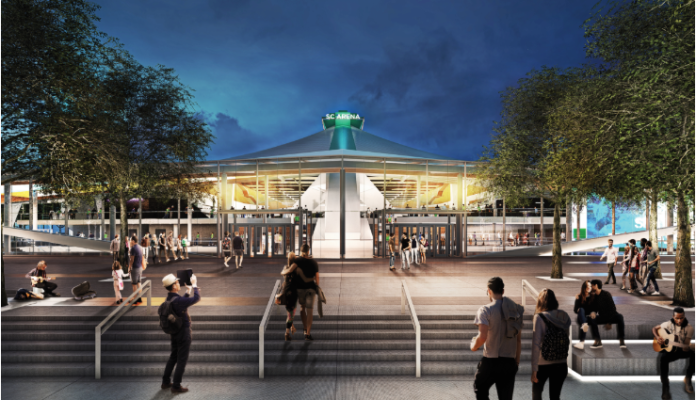On Monday, the Seattle City Council waded through a very lengthy agenda. Councilmembers voted to extend a heavy industrial moratorium in Aurora-Licton Urban Village (ALUV) in hopes of later attracting denser mixed-use development. They also passed South Lake Union design guidelines, expanded a SoDo Business Improvement Area, approved a Seattle Center Arena development agreement with $700 million in private investment, established a Redevelopment Opportunity Zone in North Rainier, and designated two new landmarks: Anhalt Hall and Colonnade Hotel.
Heavy Industrial Moratorium
Last year, the city council imposed a one-year moratorium in the Aurora-Licton Urban Village on heavy commercial and industrial uses. The purpose of the moratorium was to preempt further development of uses deemed incompatible within a walkable, transit-oriented district while the city worked to rezone the area. With the hold-up of the Mandatory Housing Affordability (MHA) rezones, the moratorium needed further extension. The city council authorized an additional six-month moratorium on heavy commercial and industrial uses in hopes that the MHA rezones will be enacted by the time the moratorium lapses.
South Lake Union Design Guidelines
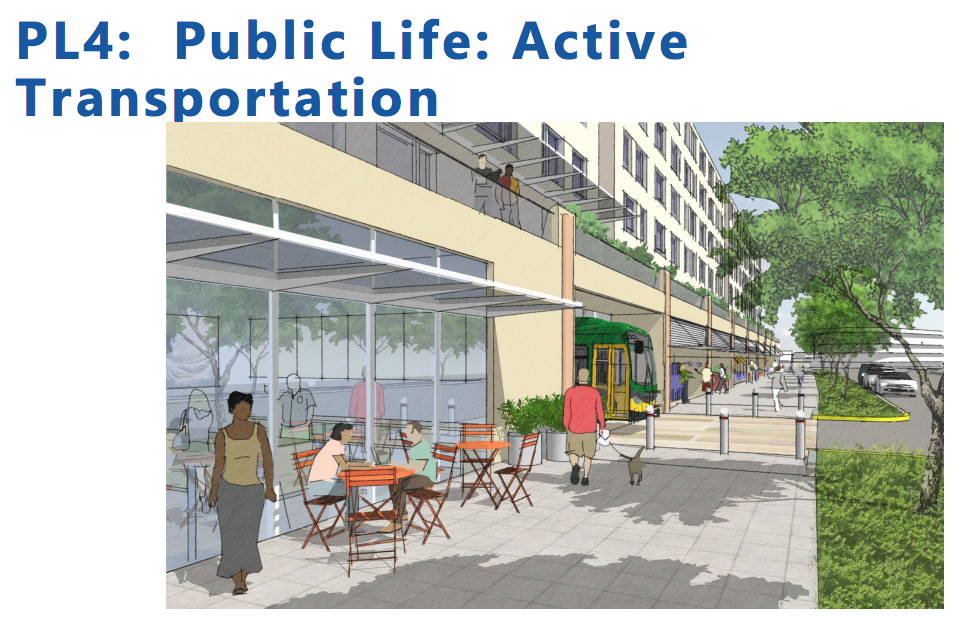
After more than a year of review, the South Lake Union Design Guidelines have been updated to reflect changing community priorities for development and become more consistent with zoning changes that took place in 2013. In short, the changes to the design guidelines include:
- Mandating consistency with neighborhood-level guidance on active transportation design and exterior design concepts for buildings;
- Removing a mandate for consistency with neighborhood-level guidance on project use and activities design (this would still need to be consistent with citywide guidance);
- Adding a new subarea (Eastlake/Mercer), renaming others, and extending the Aurora Corridor (Dexter/Aurora Corridor under the changes) further north; and
- Provide greater detail about objectives in each of the nine guideline sections.
Pedestrian Access and Circulation Requirements
The city council also approved changes to the City’s requirements for pedestrian access and circulation. The main change is clarity in the City’s ability to impose development of curbs and improvement curb ramps as part of development project. Existing regulations are not clear about this requirement and suggest that it is one of many possible improvements. Corner lot development would always be required to address curbs and curb ramps. The code changes would also better define accessibility and require all development in urban centers and urban villages to upgrade existing sidewalks, curbs, and curb ramps along their frontage to current city standards.
Expanded SoDo Business Improvement Area
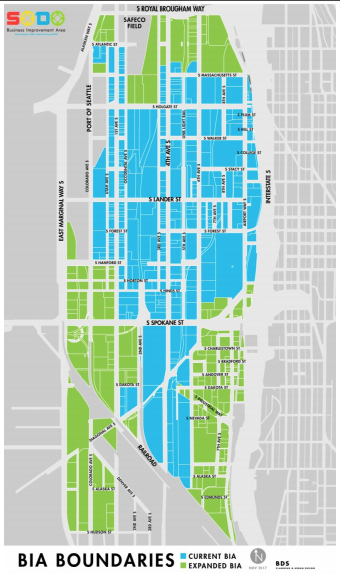
In SoDo, an expanded business improvement area (BIA) has been authorized. The BIA is charged with funding transportation improvements and management, safety efforts, cleaning, and promotion of the business district marketing and technical assistance to businesses. All of these responsibilities are done in addition to baseline city services. In other words, they don’t supplant or reduce existing city obligations and levels of service to the district.
The BIA is funded through special assessments on all commercial, multifamily, and mixed-use property owners. Generally, non-tax-exempt properties are charged at a rate of $0.50 per $1,000 in assessed property value. In the case of where a commercial tenant is located on a tax-exempt property, the BIA can charge $0.03 per square foot of leased space by such tenants. The revised BIA terms will last ten years, after which they would need to be further extended in order to keep the BIA operating.
Seattle Center Arena Development Agreement
A formal agreement with Oak View Group, LLC has been signed by the city council to authorize a development agreement for the $700 million Seattle Center Arena redevelopment. The terms of the agreement are extensive, including $40 million in funding for transportation investments, $500,000 for displacement and relocation of local businesses, $20 million for community benefits, $3.5 million for public art, $2.5 million for affordable housing, and much more. Oak View Group, LLC would have a 39-year lease of the facility and property, which could be extendable up to 55 years.
In addition to the agreement, the city council also passed an ordinance on how the admissions tax at the Seattle Center Arena shall be imposed and used as well as a resolution requiring the Seattle Department of Transportation and Seattle Department of Construction and Inspections to report on and describe the process for administering an access management plan for the arena. The access management plan will help implement various transportation strategies to reduce private automobile transportation to the arena and improve access for Uptown and South Lake Union.
Two New Landmarks
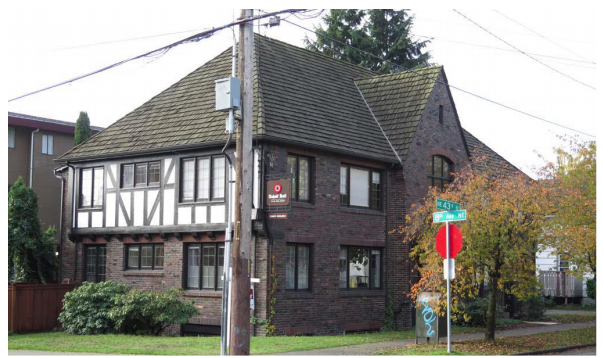
Anhalt Hall (711 NE 43rd St), designed by the famed Seattle architect Frederick Anhalt, has been designated as a historic landmark, in large part due to its unique half-timber and brick design. Anhalt designed many buildings in a similar manner across Seattle neighborhoods in the early 20th century. Anhalt Hall was built in 1928 and is located in the University District. Preservation controls will apply to the building exterior and site.
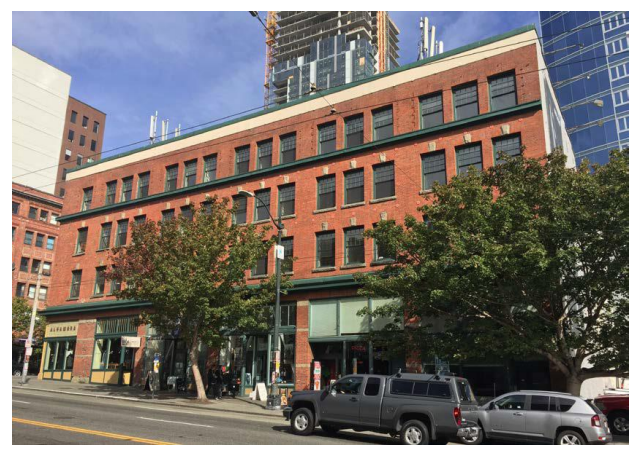
On Pine Street in Downtown Seattle, the Colonnade Hotel/Gatewood Apartments (107 Pine Street) has also been designated as a historic landmark. The build is four stories with ground floor retail spaces and historically residential units above. Originally, the building was constructed in 1900 and has been somewhat modified over the years, including loss of its more interesting parapet details. However, the overall facade and distinctive architectural elements remain. The chief architects for the building were Charles H. Bebb and James H. Schack. Preservation controls will apply to the building exterior and site.
Designated Opportunity Zone
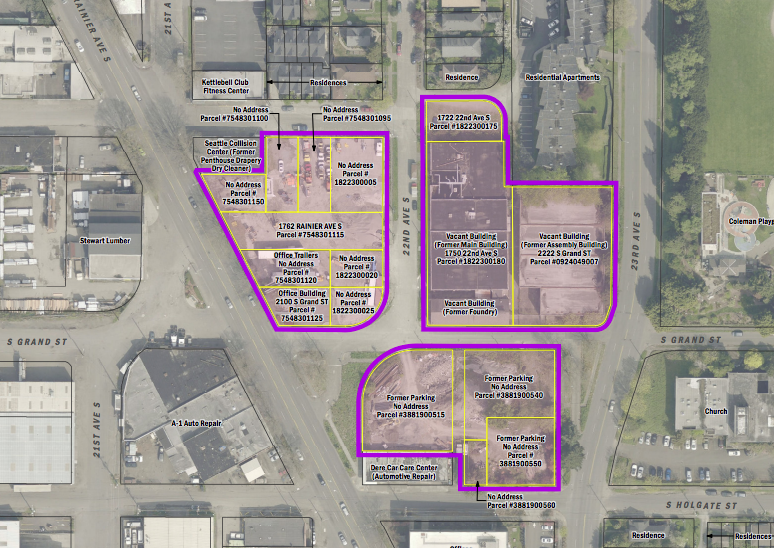
Several properties in the Rainier Valley have been designated as a Redevelopment Opportunity Zone (ROZ). This allows for the Washington State Department of Ecology to dedicated to environmental cleanup of the sites and facilitated significant affordable housing development. Mount Baker Housing Association plans to construct 150 or so affordable housing units in the ROZ. These units would be earmarked for households making at or below 60% area median income (AMI). Likewise, Lake Union Partners, LLC hopes to construct another 550 housing units within the ROZ. Up to 25% of those units would be made available as affordable housing unit under the Multi-Family Tax Exemption program and participation in the Mandatory Housing Affordability program.
Uptown Advocates Demand Better Multimodal Plan for Seattle Center Arena Renovation
Stephen is a professional urban planner in Puget Sound with a passion for sustainable, livable, and diverse cities. He is especially interested in how policies, regulations, and programs can promote positive outcomes for communities. With stints in great cities like Bellingham and Cork, Stephen currently lives in Seattle. He primarily covers land use and transportation issues and has been with The Urbanist since 2014.


